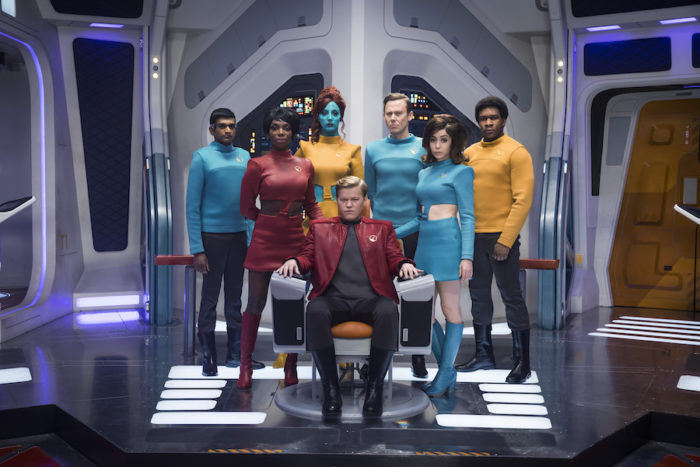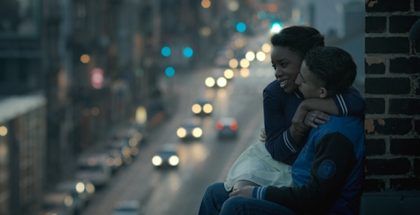Netflix UK TV review: Black Mirror Season 4 (spoiler-free)
Review Overview
Ambition
8Experimentation
8Existential dread
8David Farnor | On 06, Dec 2017
This review is spoiler-free, but contains information about the basic set-up of each episode in Season 4. If you have intentionally avoided the trailers released so far and wish to know nothing about the show, do not read on.
‘Tis the season to be paranoid about the declining state of the world and the way that technology is slowly infringing upon our everyday lives and corrupting the way we perceive reality. The fact that this could apply to any time of year right now says a lot about modern existence – and so it’s only right that, after the most Black Mirror year ever, Charlie Brooker’s dystopian anthology should return to chronicle afresh just how messed up the 21st century has become.
Now four seasons in – and with more episodes per run than its early days, thanks to Netflix’s increased budget – Black Mirror’s main weakness is that we know what to expect from the show, whether it’s cautionary stories about surveillance or a pure exposé of sheer perversion. Season 4’s episodes even broadly pair up with the chapters from Season 3: there’s the one with a hint of upbeat affection, the one with observations about the interaction between digital identities and personal lives, the one about memory and privacy, the stripped-down, visceral thriller, and the one designed to disturb you to your very core. If you can put aside the notion that Black Mirror should be surprising you with every new installment, though, this fourth season is just as insightful, unsettling and engrossing as ever.
The show benefits more and more from the way it diversifies the talent behind each episode, as filmmakers bring their own sensibilities and style to the familiar universe. Jodie Foster opens proceedings with a superbly thoughtful drama about a mother and daughter, in which a monitoring app installed in a child’s head leads to unforeseen circumstances. Shot with the slick, low-key authenticity of a polished indie drama, it’s a gentle, but challenging meditation on parental control at a time when the Internet has made it harder than ever for adults to navigate the line between protection and censorship as their kids grow up. Rosemarie DeWitt, who has impressed time and time again in Mad Men, La La Land and Your Sister’s Sister, brings real conflict and compassion to a mother just trying to do the right thing – even when that comes across as unthinkable.
The Road’s John Hillcoat, meanwhile, instils a chilling, ominous atmosphere to his Iceland-set drama, which follows Mia (Andrea Riseborough), a successful woman who finds her past coming back to haunt her. Recalling The Entire History of You, but given a Scandi-detective vibe (Kiran Sonia Sawar steals scenes as an investigator), it’s a gripping balancing act between the incidental and the bluntly life-changing.
Maxine Peake provides another superb female lead in Metalhead, which skips any delicate balancing acts for a straight-up shot of adrenaline – one that Hard Cardy helmer David Slade directs with black-and-white intensity and an ear for building gritty suspense. Clocking in at 40 minutes, it’s a ride that doesn’t let up, and a reminder that Black Mirror is trying to do more than topical prestige drama: Halt and Catch Fire this ain’t. This is Charlie Brooker looking to mess with your head in any genre available.
That becomes particularly apparent with Black Museum, a compendium episode, much like 2014’s White Christmas, which goes all the way back to Season 1’s The National Anthem and Season 2’s White Bear – a cocktail of depraved stories that become more and more horrifying, as characters justify their acts in increasingly twisted ways. Set within a US roadside attraction – a crime museum showcasing high-tech misdeeds – pain emerges as an overriding theme, as people never fail to miss an opportunity to exploit the latest tech revolutions for selfish gain, debauched pleasure or sadistic revenge. The Girl with All the Gifts director Colm McCarthy doesn’t flinch once.
If the overall moral is a naturally downbeat warning of virtual intrusion and unseen invasion, though, Season 4 of Black Mirror sees the show continue to evolve and develop its grasp of tone and form. Executive Producers Annabel Jones and Charlie Brooker have become more ambitious with every run of the programme, introducing laughs, love and even happiness to proceedings. It’s less about technology driving the story, and more about stories featuring technology, and the nuances that opens up remain enthralling. Its pertinent insight into the digital human condition makes Black Mirror essential viewing, but its ambition is what makes it rewarding, as Brooker and Jones still find ways to steer their ship into new territories.
That drive to push the series’ boundaries culminates in Season 4’s two standout episodes: Hang the DJ and USS Callister. Hang the DJ enters the world of online dating with a gorgeous romantic comedy, featuring Broadchurch’s charming Georgina Campbell, Green Room’s likeable Joe Cole and Vikings’ always-excellent George Blagden. They play people who sign up to a new dating service that maps out a series of relationships for each person in advance, logging reactions and tweaking algorithms at every stage. Less like Tinder and more like Spotify, it’s a witty examination of the way knowing what’s up next – and when – can sabotage the joy of what’s here now. From expiry dates to destiny, it’s a lovely combination of modern mindsets and old-fashioned romance, captured with precise and believable detail by Boardwalk Empire director Tim Van Patten.
USS Callister, though, is the episode that everyone will be talking about this year – and rightly so, as Brooker and William Bridges boldly go where Black Mirror hasn’t gone before. They pen a typically warped homage to Star Trek, clearly written from the point of view of dedicated fans who understand the appeal of that simpler, more sanitised portrait of life. Set in space and feature-length, it’s a brilliant showcase for Jesse Plemons (Breaking Bad), who goes full William Shatner as the captain of a diverse crew, with Fargo’s Cristin Milioti and Westworld’s Jimmi Simpson bringing the tension of everyday office politics into the shiny, colourful world built by Doctor Who director Toby Haynes. Boasting note-perfect cheesy costume design, a brilliant, pastiche-laden score, and genuinely impressive visual effects, it’s a bravura 80-minute sci-fi that manages to be more than a mere tribute, opening up questions of power, social hierarchy and even the lingering question of the danger in withdrawing from the universe into one particular dogma.
The result is exactly what you’d expect from Charlie Brooker’s accomplished anthology – and that’s no bad thing. Experimenting with runtime, genre and emotion with a growing confidence, Black Mirror’s fourth season is testament to the show’s ability to continue reinventing itself and unearth fresh terrors. With its new home on Netflix, it’s fitting that the show should become particularly fixated on the permanent nature of the digital void; a place where mortality isn’t the thing to fear, but the idea of existing there forever. It’s almost worth not bingeing the whole lot, just to appreciate how the show varies its form and themes with a deceptively subtle ease – any two episodes of this latest season could seem like different programmes altogether, if it weren’t for the underlying bleakness and niggling paranoia that unites them. Some chapters, such as Black Museum, may feel like too much ruthless provocation, while others, such as Metalhead, may come across as primarily an exercise in mood, but taken together, these wonderfully dark stories offer a compelling vision of current society, a streaming space with no safe place to escape from a 2017 that has often felt like an episode of Black Mirror itself. It’s no surprise, then, that the most satisfying episodes are the ones where hope and optimism can be glimpsed. Even looking through a glass, darkly, there are still new shades to discover.
Black Mirror Season 4 is available on Netflix UK, as part of an £9.99 monthly subscription.



















